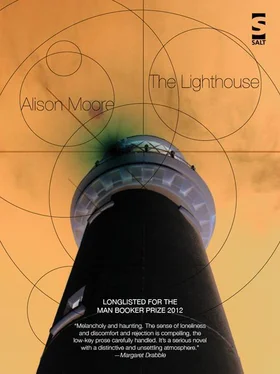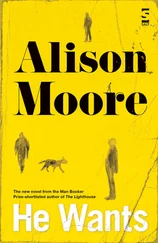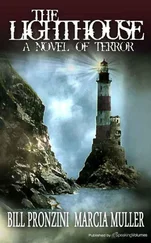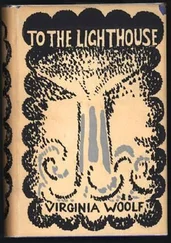He wonders what Angela is doing at this moment, then he realises that at just after nine on a Thursday morning she will be working. She will not be thinking of him.
Angela, having considered science at the local university, studied English for one term at another institution. Then she switched again and went back to biology, ending up in publishing, in the editorial office of a scientific journal. It has never really suited her. She has always complained about it. Sometimes she has specific grievances and sometimes she is just generally dissatisfied. She has always kept an eye on the vacancies in the paper, circling some of them, rather randomly, it seems to Futh. He has never really known what she wants.
On the honeymoon, when the hire car broke down, they opened up the bonnet and stood in the pouring rain looking despairingly at the lifeless engine, and Angela said, ‘I wanted to go somewhere hot.’
‘You should have said so,’ said Futh. ‘You told me you’d be happy with anything.’
‘But not this,’ she said.
Futh went to the glove compartment and found Angela’s manual and the page which depicted the engine. He went back to the front of the car and stood there for a long time looking mostly at the diagram, peering warily at the engine itself from time to time.
Angela said, ‘We need Kenny.’
Futh unscrewed an oily cap. He had a good look at it and at the thing he had taken it off and then screwed it back on again, his hands dirty now.
‘We don’t need Kenny,’ he said.
Angela did not look so sure.
When Futh finally learnt to drive, in the last year of his marriage, he bought a second-hand car through the classified ads in the local paper. Gloria said he ought to have taken Kenny with him, to check the car over before he bought it. Kenny might have spotted the various faults which the car turned out to have.
The very first time Futh tried to drive it to work he had barely gone a mile before he realised that he had a flat tyre. He wondered whether he had bought a car with a slow puncture. He had never had to change a tyre before but he was determined to do it himself. He took out his spare and the jack and with the help of the manual he managed it. He put the tools and the flat away in the boot of the car, feeling very pleased with himself. He was filthy though. He had oil and grime on his hands, under his fingernails, and on his clothes. He decided to go home and shower and change before going on to work.
He parked in a space near his house. As he turned off the engine, he was surprised to see his front door opening. Angela ought to have left for work soon after him, but she was pregnant again and he wondered if she had felt unwell. He was just about to open the car door and get out when he saw that it was not Angela coming out of the house but Kenny, smoking a cigarette. Kenny seemed to look right at him through the windscreen and Futh felt a reflexive desire to hide. Then Kenny turned away, closing the front door behind him and dropping the stub of his cigarette onto the doorstep, and Futh wondered whether the sun was glaring off the windscreen so that Kenny could not see him after all. Without looking again in Futh’s direction, Kenny checked his fly and walked away.
After a minute, Futh got out of his car. Glancing at the still-smouldering fag end on his doorstep, he let himself into his house. He stood unmoving in the smoky hallway for a while and then went upstairs. The bedroom door was wide open. Angela was dressing, and he watched her, looking at her body become strange.
When she noticed him, she jumped and said, ‘What are you doing here?’ Glancing at the untidy bed, she did not wait for a reply before saying, ‘I’ve only just got up. I wasn’t feeling well. It’s morning sickness, I suppose.’
The bedroom smelt of cigarette smoke and he said so. ‘I wish you wouldn’t smoke,’ he told her, coming into the room to straighten the covers on the bed.
It was Angela who, not long after this visit of Kenny’s and in the run-up to Christmas, said to Futh that she thought they should separate, and Futh was astonished. Later, though, he thought about how often he had caught her rolling her eyes or sighing, and he thought that perhaps, having seen all this before, he should have seen it coming.
His father and Gloria said, ‘But what about the baby?’ and Futh said that they had lost it, a phrase which did, he supposed, suggest some degree of culpability; perhaps it was like losing a ship which failed to face down some natural or man-made disaster.
It was agreed that Futh would be the one to move out, but he did nothing about it for months on end. It was Angela who finally found him a flat to move into and packed up his belongings and arranged for a removal firm to come and take them away.
He applies some sun cream to his neck and his legs, and then, with the sense that it is all downhill from here, he shoulders his rucksack again and sets off.
He is not carrying any lunch. He did not pocket anything at breakfast that morning, having eaten in a small, quiet dining room under the gaze of the proprietor. He is not aware of having passed a bakery on his way out of town and does not want to turn back and walk any further than he has to looking for one. The day’s hike is a relatively easy one. He expects to be at his next stop by mid-afternoon when, he decides, he will eat a late lunch and enjoy a rest.
He is nearing the end of his circular walk now. Tomorrow he will be back at Hellhaus and then he will be going home. Except that he will not be going home, he will be going to his new flat. He thinks of the big front door shared by all the tenants, and the hallway, the concrete floor onto which the bills and circulars drop. He thinks about the buzzers and pigeonholes with these strangers’ names written underneath them on little slips of paper. The name on his, he thinks, will be missing, or somebody else’s name will be there instead. He thinks about his unknown predecessor, and the bed whose mattress is stained by and sags from the weight of the strangers who have been there before him. At least the flat is furnished. There are cupboards and drawers into which he will put his belongings which, at present, are wrapped and packed into boxes which Angela has labelled. There are carpets and curtains but no lightshades. There is a sofa but there are no cushions. There is a kettle and a microwave oven but no washing machine. There is a television and a phone line but no phone.
It reminds him of his first student flat, except that he did not live alone there.
He thinks of the things he needs to do. He needs to buy plates and cups and cutlery, although he could make do, at first, with paper plates and plastic cutlery, disposable things. He needs cushions and bedding, lightshades and lightbulbs. Perhaps, he thinks, he ought to have wine glasses and coffee-table books. He needs to get a phone connected, and to write his name on little bits of paper and put them on his buzzer and his pigeonhole.
By midday, the heat is quite fierce. There is not a single cloud in the blue sky. Futh puts sun cream on his already peeling skin — on his face and up beyond the receding line of his thinning hair. His father, who is now almost eighty, still has pretty much a full head of hair. Futh wonders whether he takes after his granddad, the one who never made it home. Ernst said that he did. Futh only remembers his granddad as a balding man close to death.
In the early afternoon, Futh notices that his feet are burnt. The skin is hot and pink between the straps of his sandals, and still blue-white underneath the straps, like the perfect band of pale skin on a ring finger when a wedding ring is removed for the first time in years.
It is also then that he realises that he is lost.
He stands in a field looking at his map, looking around for the features which ought to be there but are not. He has no sense of direction. But he does have that compass, which he now fishes out of a side pocket of his rucksack. He cannot get any sense out of it though and finally realises that it is broken. He looks up at the sun. It is high in the sky and does not help him. He turns, gazing back at the path of trampled grass along which he has come. Considering retracing his steps, he wonders about all the points along the way at which he might have made a mistake, missed a turning, lost in thought.
Читать дальше












